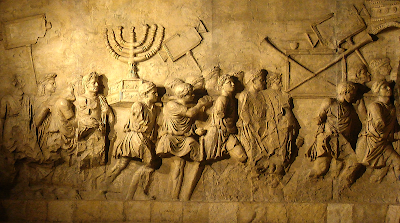The Greek title for Revelation is Apokalupsis, Apocalypse, which literally means "the unveiling." The idea being that the readers of Revelation would have the "veil" pulled off their eyes and be presented with the actual picture of reality.
The letter, with all of its amazing imagery, showed the reader that things were not as they seemed and although it may not look like it, God, not Caesar, was actually the one in control of history. That "Jesus Christ was the ruler of the kings of the earth" (Rev 1.5).
At the heart of Revelation is a message aimed at bolstering perseverance in the face of adversity and as I wrote yesterday, the original readers were experiencing adversity.
Here's how the text conveys that message:
The letter, with all of its amazing imagery, showed the reader that things were not as they seemed and although it may not look like it, God, not Caesar, was actually the one in control of history. That "Jesus Christ was the ruler of the kings of the earth" (Rev 1.5).
 |
| A Christian Dirce by Siemiradzki - a Christian woman martyred under Nero. |
Here's how the text conveys that message:
Revelation 1.3 reads "Blessed is the one who reads aloud the words of the prophecy, and blessed are those who hear and keep what is written in it; for the time is near."
When a letter reached a community in the ancient world, the community would gather and listen to the letter read out loud.
This is how the letter of Revelation was received by its original communities - a fact that dramatically affects how the book is to be understood. The first readers, the majority of which were actually "hearers", wouldn't have had the opportunity to sit and investigate every line of the letter.
Instead, the hearer-reader would have listened to the letter from start to finish and allowed the vivid imagery to overwhelm him/her. In this way the hearer-reader could not help but be immersed in the powerful message that God was in control and would one day make all things right (Rev 21.3-5).
And although the images are quite unfamiliar to the modern reader, they weren't to the original audience. Of the 404 verses in the letter of Revelation, 278 of them contain either an allusion to or a quotation from the Hebrew Scriptures.
The original hearer-readers had no problem understanding the powerfully symbolic language, nor any problem knowing what to do with it.
In this way, Revelation functions much like the modern day movie trailer:
When a letter reached a community in the ancient world, the community would gather and listen to the letter read out loud.
 |
| So it's Brando and he's not reading, but you get the idea! |
Instead, the hearer-reader would have listened to the letter from start to finish and allowed the vivid imagery to overwhelm him/her. In this way the hearer-reader could not help but be immersed in the powerful message that God was in control and would one day make all things right (Rev 21.3-5).
And although the images are quite unfamiliar to the modern reader, they weren't to the original audience. Of the 404 verses in the letter of Revelation, 278 of them contain either an allusion to or a quotation from the Hebrew Scriptures.
The original hearer-readers had no problem understanding the powerfully symbolic language, nor any problem knowing what to do with it.
In this way, Revelation functions much like the modern day movie trailer:
The trailer, through its powerful images, intense music, and emotional subject matter, serves only one purpose: to convince the audience to see the movie.
Revelation's powerful images, intense scenarios, and incredible picture of hope for those who trust God, serve only one purpose as well: to infuse life into the most desperate of circumstances.
Keep this in mind the next time you crack open the letter of Revelation. Read it letting the images overwhelm you and use its message of hope and its challenge to live as if God is really in control, to guide you through your life.
For an excellent resource for your journey through the letter, see Eugene Boring's commentary that is the farthest from his namesake.
























